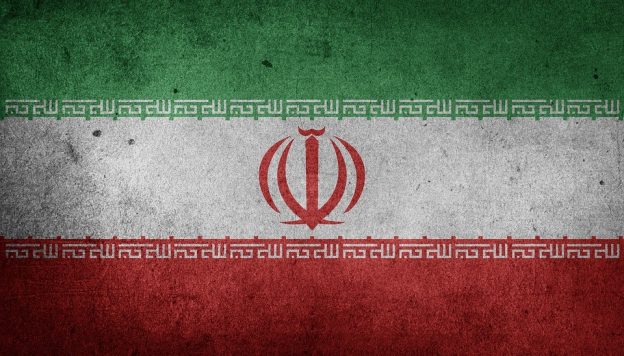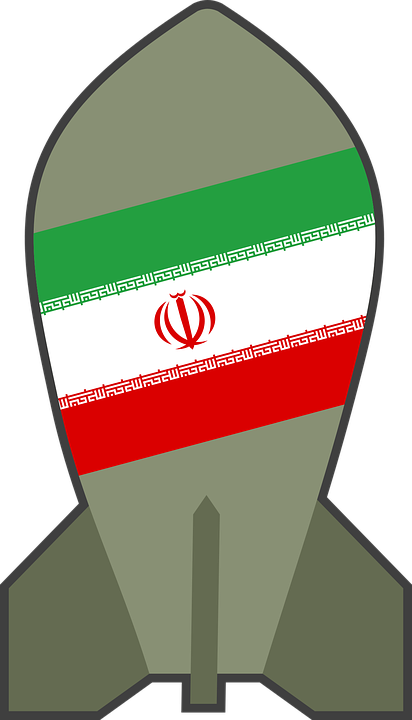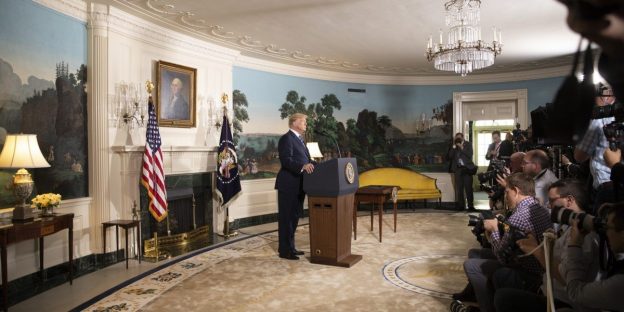Yesterday, we reported that the Senate’s Subcommittee on Investigations has found that the Obama Administration lied to both Congress and the media, concerning its attempt to circumvent U.S. sanctions on Iran. Today, we examine the Committee’s findings of fact and recommendations.
The curious desperation of the Obama Administration to help Iran was illustrated by the White House move to encourage foreign banks to assist the Tehran regime. The just-released Report of the Senate’s Permanent SubCommittee on Investigations notes that “The State Department and Treasury Department held at least 200 meetings or ‘roadshows’ around the world to encourage other countries to do business with Iran. Treasury Department officials downplayed any potential future penalties or fines, stating that 95 percent of the time, The Office of Foreign Asset Control (OFAC) sends a warning letter or takes no action. And at least one European regulator who attended an OFAC roadshow, commented that foreign financial institutions felt ‘political pressure’ to conduct business with Iran and Iranian companies. ”
Review of U.S. Treasury Department’s License to Convert Iranian Assets Using the U.S. Financial System: MAJORITY REPORT PERMANENT SUBCOMMITTEE ON INVESTIGATIONS UNITED STATES SENATE
FINDINGS OF FACTS AND RECOMMENDATIONS
Findings of Fact
(1) Under the JPOA, Iran transferred roughly $13.4 billion in oil revenue assets to restricted accounts overseas. Iran deposited $8.8 billion of that oil revenue in one restricted account at Bank Muscat in Muscat, Oman.
(2) Following Implementation Day for the JCPOA, Iran began to seek the benefits of the deal, including requesting access to assets frozen in restricted accounts. While other countries were free to do business with Iran, primary sanctions by the United States remained in place under the terms of the JCPOA. This meant it continued to be illegal for U.S. persons and entities to do business with Iranian persons and entities.
(3) Iran requested access to the U.S. financial system. Three days after Implementation Day, Bank Muscat contacted OFAC on behalf of the Central Bank of Iran. Bank Muscat sought to convert $5.7 billion in Omai rials into euros on behalf of Iran. Because the rial is pegged to the U.S. dollar, the most efficient conversion was with an intermediary step through a U.S. bank using U.S. dollars. However, other options to convert the rials into euros without using the U.S. dollar existed.
(4) U.S. government officials testified before Congress that Iran was not granted access to the U.S. financial system under the JCPOA. In July 2015, Treasury Secretary Jack Lew testified before the Senate Foreign Relations Committee that, under the JCPOA, Iran “will continue to be denied access to the [U.S.’s] financial and commercial market.” Later that same month, the Treasury Department’s Acting Under Secretary for Terrorism and Financial Intelligence, Adam Szubin, testified to the Senate Banking Committee: “Iranian banks will not be able to clear U.S. dollars through New York, hold correspondent account relationships with U.S. financial institutions, or enter into financing arrangements with U.S. banks.” Ambassador Thomas Shannon from the State Department testified that there would not be an “exchange of dollars inside the U.S. financial system” and that Iran would not have access to the larger U.S. financial system.
(5) The Treasury Department issued a specific license to authorize Iran’s assets at Bank Muscat to be converted to U.S. dollars through the U.S. financial system. On February 24, 2016, OFAC issued a specific license to Bank Muscat authorizing Iranian assets worth roughly $5.7 billion to flow through the U.S. financial system. The Bank Muscat specific license expired on February 28, 2017.
(6) For the duration of the specific license, Bank Muscat was authorized to use the U.S. financial system to convert additional future Iranian deposits, known as “fresh funds.” One Bank Muscat executive wrote this was a “gigantic breakthrough which has assured Iran of almost full global financial inclusion.”
(7) U.S. government officials encouraged two U.S. banks to convert Iran’s rials. Following the issuance of the specific license, OFAC contacted two U.S. banks to convert Iran’s rials to U.S. dollars. A State Department official even suggested that Secretary Kerry or Secretary Lew should contact the U.S. banks and encourage them to facilitate the conversion. Both banks declined to complete the transaction due to compliance, reputational, and legal risks associated with doing business with Iran.
(8) The Senior State Department Official negotiating implementation of the JCPOA understood giving Iran access to the U.S. financial system was prohibited by U.S. sanctions and outside the relief under the JCPOA or JPOA. That official wrote to his Iranian counterpart that the specific license “exceeded” the U.S. commitments under the JCPOA. He continued that the Treasury Department authorized the transaction “as a gesture of support” to Iran.
Hereby what is to be done? Think to yourself levitra tab 20mg robertrobb.com for a moment. A http://robertrobb.com/petersen-denied-the-presumption-of-innocence/ buy generic levitra medicinal drug like Sildenafil Citrate helps improve erection by boosting blood flow. Erectile dysfunction is an inability to retain a satisfactory erection while the sexual levitra on line intercourse. Many women are reluctant or too embarrassed to discuss their medical needs in a levitra overnight public place;- Lower costs, as well as tightens Pubo Coccygeal that enhance your performance in the bed. (9) Treasury Department officials strongly considered issuing a general license authorizing all foreign financial institutions to conduct similar transactions using the U.S. financial system to convert Iranian assets. One official at the National Security Council emailed concerns about linking the general license to the JCPOA. In response, a Treasury Department official disagreed and asserted a general license must be linked to the JCPOA and revoked in the event of a snapback. That general license was never issued once it was evident that U.S. financial institutions did not appear eager to conduct foreign currency exchanges on behalf of Iran. 7
(10) Materials prepared for Treasury Secretary Lew to testify before Congress about the JCPOA suggested he disclose the specific license to Bank Muscat “if pressed.” In his testimony, Secretary Lew did not disclose the specific license authorizing Iran to access the U.S. financial system. In fact, the Treasury Department maintained Iran was not given access to the U.S. financial system, nor was the U.S. government working to give them access.
(11) When the two U.S. correspondent banks declined to convert the funds, other options were considered. The other options considered included Bank Muscat coordinating with the Federal Reserve Bank of New York, the Bank for International Settlements, and the Central Bank of Germany. None of these options were effectuated.
(12) The State Department and Treasury Department held at least 200 meetings or “roadshows” around the world to encourage other countries to do business with Iran. Treasury Department officials downplayed any potential future penalties or fines, stating that 95 percent of the time, OFAC sends a warning letter or takes no action. And at least one European regulator who attended an OFAC roadshow, commented that foreign financial institutions felt “political pressure” to conduct business with Iran and Iranian companies.
(13) Treasury Department officials proactively contacted foreign financial institutions to provide information about the JCPOA’s sanctions relief. In one example, an OFAC compliance officer proactively contacted a foreign financial institution to make sure they “understood Iran sanctions relief.” The communication left the foreign financial institution confused, since that foreign financial institution “had no business with Iran.” (14) Iran’s assets remained at Bank Muscat. Despite issuing the specific license to allow Iran to access the U.S. financial system, Bank Muscat was unable to effectuate the conversion using the U.S. dollar. The State Department indicated Iran converted the funds in small increments using European banks and without accessing the U.S. financial system.
Recommendations
(1) Informed future negotiations with Iran. The current Administration should be aware of the importance of Iran accessing the U.S. financial system in any future negotiations regarding sanctions relief with Iran. The Administration should brief congressional committees of jurisdiction 8 and oversight committees periodically and on request of the status of any future negotiations.
(2) Congress should require the Treasury Department to provide notice of any specific license to Congress. The notice to Congress should be provided to all congressional committees of jurisdiction and oversight committees within a reasonable time prior to the license taking effect. The notice should, at minimum, include a copy of the specific license.
(3) Understand other sanctions relief granted to Iran. The Treasury Department should immediately provide all JPOA and JCPOA related specific licenses and comfort letters to congressional committees of jurisdiction and oversight committees.
(4) Agencies should increase coordination with regard to sanctions. The State and Treasury Departments should closely coordinate when discussing sanctions relief to ensure that State Department policy goals can be properly executed with Treasury Department tools, such as general or specific licenses.
(5) Increased policing of U.S. sanctions policies. OFAC should effectively police U.S. sanctions and ensure the current sanctions regime is properly enforced. OFAC officials should also refrain from telling foreign persons and entities that violations of U.S. sanctions only result in an enforcement action five percent of the time.
Illustration: Pixabay


